KENPRO Policies/ Provisions fall under the following: Research Support, Project Planning and Management, Information Communication Technology, Publishing and Training Provisions.
1.1 Proposal Writing
In proposal writing, KENPRO engages in the following:- Offering guidance on identification of research topics,
- Gathering resources for building the background to the study,
- Guidance of research objectives/questions/hypotheses,
- Offering support in statement of research problem,
- Guidance on conceptual and theoritical frameworks.
- Gathering resources for literature review (journals, studies),
- Developing research design and methodology,
- Designing Data Collection Instruments,
- Reviewing proposals based on the supervisors’ or panel’s review.
1.2 Data Coding and Analysis
1.2.1 Data Coding
KENPRO assists clients in entering the data into the Computer: Data from questionnaires is coded and logged in the computer using Statistical Package for Social Science (SPSS). This involves coding close ended items in order to run simple descriptive or inferential analysis to get reports on data status. The qualitative data is sorted, categorized and processed using word processing applications.1.2.1 Data Analysis
After receiving data from the field, KENPRO screens it for accuracy so as to ensure no major errors. In screening, KENPRO research team seeks to establish whether: the data are legible, the major items have been answered and the responses are complete. KENPRO engages in both Quantitative and Qualitative Analysis. Quantitative Analysis: Quantitative data analysis involves both descriptive and inferential analysis (where applicable). Descriptive analysis such as frequencies and percentages, means and standard deviation are used to present quantitative data. This is done in order to describe what the data shows. Inferential Analysis is used to test the hypothesis. This involves t-tests and Analysis of Variance (ANOVA), Chi-square, regression, factor analysis among other approaches used in inferential analysis. Qualitative Analysis: Data from the interview guide or focus group discussion is analyzed qualitatively. This involves the process of transcribing if the data are recorded. The data are first transcribed into written form for closer investigation. After transcribing the recorded data, the team reads through to remove ambiguity and repeated items (to make sense), organizes into themes and patterns following the major research questions or objectives. In case the data from interview are not recorded, qualitative analysis is done by reading through all the items to get the emerging themes which are organized thematically according to the research objectives.1.3 Paper Writing
KENPRO is involved in supporting individuals and organizations in developing papers and articles of high standards. These papers/ articles are written based on the instructions provided by the individual clients.1.4 Style of Writing
KENPRO follows the required style of writing including APA, MLA, Harvard system, Chicago etc.). This requirement includes not only general task format but also Properly Referenced (in-text citations, footnotes, works cited, references, bibliography, etc.). Other tasks in respective disciplines shall be done in accordance with their particular requirements as per provisions of various colleges and universities.1.5 Plagiarism
Plagiarism is understood as stealing other people’s ideas. The organization endeavors to maintain originality of the work. Any borrowed information or quote is properly referenced. If plagiarism is noted in a piece of work, an associate shall be required to revise. An associate shall be called upon to forfeit his/her membership if noted to have plagiarized more than three times consecutively.1.6 Revision/Review
- In case revision or amendments of the work is required, the associate handling the work is assigned the duty of reviewing the work within the given time frame,
- The customer takes full responsibility of his/her own errors(incorrect instructions regarding a project),
- All the works of our customers are revised FREE of CHARGE
- KENPRO Team revises all major technical aspects of research such as background to the study, statement of problem, study parameters, conceptual and theoretical framework, theoretical and empirical review, research design, methodological and analytical issues.
- Some resources (locally available) may not be within our reach as per specified time frame. Thus KENPRO Team may be compelled to request our customers for support in providing some of these resources in order to facilitate the revision process.
- KENPRO Team accompanies the client till the end of the project cycle, including defense preparation.
- KENPRO Team is committed to projects review knowing that Review is the hallmark of any scholarly endeavor.
1.7 Client’s Responsibility
- Liaising with university supervisor(s) regarding the project,
- Providing research guideline (as provided by the institution),
- Taking up ‘minor’ errors of commission or omission (typographical, orthographical, grammatical, etc…) without necessarily involving KENPRO Team,
- Providing the necessary resources as need arises – based on the recommendations,
- Keeping KENPRO updated in case of any changes
- Owning the work through expert guidance and internalization.
In an information age, no organization can claim to strategically position itself without embracing the ever evolving information technologies. Well aware of this, KENPRO continues to build organisations through the following: Designing dynamic websites, Designing systems based on the organization’s unique needs, Designing organisation’s corporate identity (logos, letter heads). Installing the upto date computer applications and systems, Offering Training in ICT.
KENPRO offers training in each of the highlighted areas including Projects Planning and Management, Information and Communication Technology, Research and Publishing.
